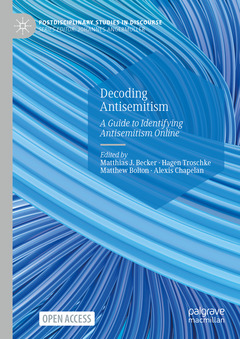Decoding Antisemitism, 1st ed. 2024 A Guide to Identifying Antisemitism Online Postdisciplinary Studies in Discourse Series
Coordonnateurs : Becker Matthias J, Troschke Hagen, Bolton Matthew, Chapelan Alexis

This Open Access book is the first comprehensive guide to identifying antisemitism online, in both its explicit and implicit forms. Developed through years of on-the-ground analysis of tens of thousands of authentic web comments the book maps out and deconstructs, with concrete examples, more than 45 key antisemitic concepts. The guide was assembled by researchers working on the Decoding Antisemitism project at the Centre for Research on Antisemitism at Technische Universität Berlin, building on and extending existing definitions of antisemitism, and drawing on expertise in the fields of conceptual history, antisemitism studies, linguistics, discourse and image studies, and social media studies. Using authentic examples taken from social media discussions over the past five years, it develops a pioneering step-by-step approach to identifying and categorising antisemitic content, providing guidance on how to recognise a statement as antisemitic or not. It shows how to establish whichantisemitic concept a statement expresses, and the linguistic or visual means by which it is communicated. This book will be an invaluable tool for researchers, students, practitioners in education, police, justice, NGOs and politics, and social media moderators to learn to recognise contemporary antisemitism in all its breadth and diversity. It also establishes a framework which can be adapted by those working on other hate ideologies, including misogyny, racism, and homophobia.
EDITORS' INTRODUCTION.- TAXONOMY OF KEY LINGUISTIC TERMS.- 1. Tropes (classic/canonical).- 1.1. Jews as foreign/the other (Laura Ascone).- 1.2. Evil/Devil (Matthew Bolton).- 1.3. Child murder/Blood libel (Karolina Placzynta).- 1.4. Racist tropes/Dehumanisation.- 1.5. Immorality/Amorality (Jan Krasni).- 1.6. Lie (Hypocrisy/Mendacity) / Deceit (Matthias J Becker).- 1.7. Vengefulness (Jan Krasni).- 1.8. Disloyalty/Dual Loyalty (Hagen Troschke).- 2. Tropes of (political or financial) power.- 2.1 Greed/Exploitation/Identification with capitalism (Matthew Bolton, Chloe Vincent, Alexis Chapelan).- 2.2 Influence on public opinion, politics, economy (& servility) (Matthias J Becker).- 2.3 Conspiracy (Alexis Chapelan).- 2.4 Disintegration (Marcus Scheiber).- 2.5 Self-victimisation (Alexis Chapelan).- 3. Secondary Antisemitism.- 3.1 Clean break (Hagen Troschke).- 3.2 Rejection of guilt (Hagen Troschke).- 3.3 Relativisation/Distortion/ Denial of the Holocaust (Hagen Troschke).- 3.4 Relativisation & Denial of Antisemitism (Marcus Scheiber).- 3.5 Instrumentalisation of the Holocaust (Matthias J Becker).- 3.6 Instrumentalisation of Antisemitism (Matthias J Becker).- 3.7 Nazi-Jewish collaboration (Jan Krasni).- 3.8 Admonisher (Marcus Scheiber).- 3.9 Taboo of Criticism (Alexis Chapelan).- 3.10 Victim-Perpetrator reversal (Hagen Troschke).- 3.11 Jews have not learned from the past (Karolina Placzynta).- 4. Further Post-Holocaust concepts.- 4.1 Blame for Antisemitism (Marcus Scheiber).- 4.2 Holding Jews collectively responsible for IL’s actions (Karolina Placzynta).- 4.3 Privilege & Free Pass (Karolina Placzynta).- 4.4 Affirmation of Hitler/Nazis/Holocaust (Jan Krasni).- 5. Attacks on Israel’s legitimacy/statehood.- 5.1 Nazi Analogy (Matthias J Becker).- 5.2 Apartheid Analogy/ Racist state (Matthew Bolton).- 5.3 Colonialism Analogies (Laura Ascone).- 5.4 Terrorist state (Matthew Bolton).- 5.5 Genocide (Matthew Bolton).- 5.6 Double Standards (Chloe Vincent).- 5.7 Denial of IL’s right to exist (Chloe Vincent).- 5.8 BDS/Boycott (Matthew Bolton/Hagen Troschke).- 5.9 Israel’s sole guilt in the conflict (Chloe Vincent).- 6. Self-positioning in speech acts.- 6.1 Insults (Laura Ascone).- 6.2 Threats (Laura Ascone).- 6.3 Curses (Marcus Scheiber).- 6.4 Death wishes (Karolina Placzynta).- 6.5 Affirming, calling for, desiring violence (Laura Ascone).
Matthias J. Becker is the Project Lead on the “Decoding Antisemitism” research project (TU Berlin, Germany). In 2021, Palgrave Macmillan published his PhD thesis Antisemitism in Reader Comments: Analogies for Reckoning with the Past.
Hagen Troschke is an interdisciplinary researcher focusing on current developments of antisemitism. His areas of both research and knowledge transfer include antisemitism (its history, language, and iconography), hate speech, racism, far-right ideologies, and their manifestations on social media.
Matthew Bolton is Co-Lead on the UK team of the “Decoding Antisemitism” project. He is the co-author of Corbynism: A Critical Approach (2018). His work has appeared in journals including Philosophy & Social Criticism, Political Quarterly and Journal of Contemporary Antisemitism.
Alexis Chapelan is a PhD candidate at the EHESS in Paris, France and the University of Bucharest, Romania with a focus on the history of political ideologies, discourse polarisation, extremism and conspiracy theories. He is a researcher within the French team of the “Decoding Antisemitism” project.
Date de parution : 05-2024
Ouvrage de 316 p.
14.8x21 cm
Thèmes de Decoding Antisemitism :
Mots-clés :
antisemitism; anti-Semitism; hate speech; stereotypes; internet studies; qualitative analysis; Open Access


